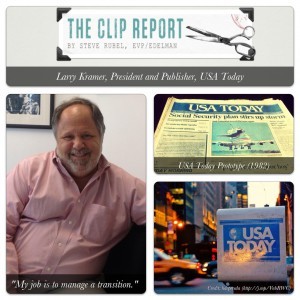This Week in Thought Leaders: Sleeping Your Way to the Top, Calling Out Jack Welch's Theories, More
This week, we assembled the biggest names in business and gave them a challenge: Share something interesting with 175 million professionals.

The insights, part of LinkedIn's new thought leader program, spanned across industries and veered into politics, philanthropy and even food. Barack Obama and Mitt Romney outlined how they’d create jobs, while Panera Bread’s founder and co-CEO, Ron Shaich, sounded off on why he’s counting the days until Nov. 7.
The most popular post of the week, however, came from Richard Branson, the billionaire entrepreneur who attracted more than 100,000 followers in just 72 hours by describing the five secrets to starting a successful business. (No. 1: Listen more.)
Want a recap of the week? Here’s a look back at some of the most noteworthy posts:
Neil Barofsky: Calling BS on the BS on the BLS Did the government really manipulate Friday's jobs numbers, as former GE CEO Jack Welch and others claim? Barofsky, the former inspector general of the Troubled Asset Relief Program, says he's seen government accounting tricks at work. But, this time, he's not buying that argument.
Caterina Fake: How to Create Time The secret to finding more time isn’t obsessively organizing your calendar; it’s the opposite. Fake’s tricks: not scheduling meetings at specific times, sleeping in shifts and going offline to avoid “editing a Wikipedia entry on Even-toed Ungulates."
James Citrin: How Do Careers Really Work? Most careers have three phases: promise, momentum and harvest, says Citrin, a director at executive search firm Spencer Stuart. So what’s the best strategy for handling each one?
Sallie Krawcheck: Why the Glass-Steagall Debate Doesn't Matter So many ex-bankers have come forward with ideas on how to simplify the financial system that “it’s a bit like watching an alumni basketball game.” But, like a basketball game, this score doesn’t particularly matter, Krawcheck says.
Eric Ries: How a Behemoth Like Nordstrom Learned to Act Like a Startup Nordstrom, with its $9 billion in annual revenue, isn’t exactly a nimble up-and-comer. But, it’s starting to act like one. Ries goes inside the company to see how one-week iterations, Toyota-inspired production techniques and lots of testing are reshaping how the retailer does business.
Peter Guber: Why You Should Aim for the ‘Red Zone’ in Business When Guber recently bought part of the LA Dodgers with a group of business partners, he was “flying in the red zone.” Business leaders, he says, need to do the same.

Linda Coles: Five Lessons to Get 1 Billion Users Facebook is now home to one billion users, or about a seventh of the world's population. How did that happen, and what can other businesses learn from the company? Coles breaks it down.
Clara Shih: How the Best Boards Operate The social media expert has been on Starbuck's board for the past year. And in that time, she says she learned something about what works -- and what doesnt.
Want to read more? Go here to follow thought leaders, and to nominate luminaries who you think should be sharing their insights on LinkedIn.
Editor's Note: This blog post is syndicated from LinkedIn Editor Chip Cutter. Follow him on LinkedIn for more.



